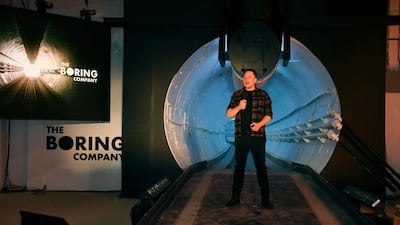A company backed by tech billionaire Elon Musk has been awarded a nearly $49 million (Dh179.9m) contract to build a transit system using self-driving vehicles under the Las Vegas Convention Centre.
The board of the Las Vegas Convention and Visitors Authority approved the contract on Wednesday with the Boring Company, the enterprise backed by Mr Musk in Hawthorne, California.
The self-driving electric vehicles will come from three types of Tesla Model X chassis.
The system will be capable of taking up to 16 people at time in both directions through parallel tunnels less than 1.6 kilometres long.
The system also will include a pedestrian tunnel and three underground stations accessible from convention centre's halls.
The company plans to immediately seek permits to start construction in September. It aims to debut the system by December 2020.
"The first thing that's important is to get it right," the authority's president and chief executive, Steve Hill, told the Las Vegas Review-Journal.
"We want to do it as quickly as possible but we want our customers to be comfortable with it."
Las Vegas Mayor Carolyn Goodman cast the only vote against the project. At a meeting last week, Ms Goodman said she was concerned about hiring a company that had not yet delivered a transit system.
The authority will reimburse the company as it completes certain stages, such as excavation for the first station and digging the first 30.5 metres of the first tunnel.
Full payment is contingent on the company proving the system can carry an average of 4,400 passengers an hour.
Construction will be able to proceed without disruption to traffic or anything else happening on the surface, Mr Hill said.
The system also could be expanded and be part of the solution to the city's transport problems, he said.

